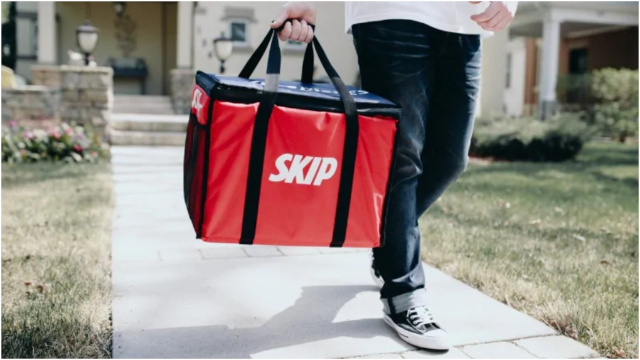Just Eat Takeaway (JET) has laid off 350 employees at its Canadian logistics hub, triggering talk of a continuing Food Delivery Sector downturn. Industry observers say its just another dimension of the ongoing disruption hitting the food distribution system…
 Skip The Dishes is the leading Canadian Food Delivery brand to
Skip The Dishes is the leading Canadian Food Delivery brand to
show cracks as the Food Delivery sector continues to slide…
JET is a holding company that owns such well-known brands as Skip The Dishes, Foodora and Grubhub. In fact, the Netherlands-based company controls similar services in 22 countries around the globe with more than 94 ‘active customers’. As JET goes, so goes the industry.
A quiet implosion
Though the slide has not been headline news, JET’s brands and others have suffered major business drop-offs over the past year and more. The result has been a string of mergers and acquisitions leading to major consolidation in the sector.
The new JET layoff is especially significant in that it involves one of the company’s global logistics hubs (in Winnipeg) that serve JET companies in a number of global markets. That’s an undeniable signal that the Food Delivery Service sector is hurting everywhere.
JET reported last month its losses for the first half of 2022 had grown more than seven-fold, to €3.5-billion ((US)$4.6-billion) from €486-million a year earlier.
What’s behind the business crash?
Rampaging food price hikes and soaring overall inflation have made it rapidly harder for the average folks to feed their families. Food Bank demand is up while donations are off sharply – because more people need support and fewer can afford to give.
Not only is it harder to fill all the hungry bellies, it’s much harder to ensure that families are getting proper, balanced diets. Food delivery services have been among the first ‘frills’ folks have deep-sixed.
The delivery industry has also suffered from a string of parallel cost increases including fuel price hikes, demands for rate caps and disputes with employees over wages and working conditions.
JET’s shares have lost a staggering 70 percent of their value since last November, in spite of emergency cost cutting and layoffs.
Competition is, understandably, grinding
All that doesn’t even take into account that competition between JET brands and their competitors has become more intense in the past several months. Witness, for example, the recent discount offering by Door Dash. It’s deep-discount Summer Dash Pass program offers month-long savings on a huge variety of food delivery services across the U.S. and Canada.
And don’t forget that all the major players in the Fast Food (grab-and-go) sector have recently begun to implement new business models developed during the COVID crisis, designed to optimize pick-up and drive-thru ordering and fulfillment. They don’t say so explicitly, but they appear to be making it simpler (and cheaper) for their customers to grab their own orders, bypassing the ever-more-costly delivery option.
My take
Delivery was a great idea during the pandemic, but not so viable as folks got back out into the world.
It’s only a matter of time before the big-name food delivery players start merging or faltering.
Judging by that 70 percent drop in JET shares over the past 10 months, the breaking point for the industry is imminent. I’m just glad that a.) I don’t rely on them for access food, b.) I don’t have any investments in them, and c.) I don’t work for them.
I’m just curious as to where they’ll end up vis à vis their place in the foodservice sector…
~ Maggie J.

